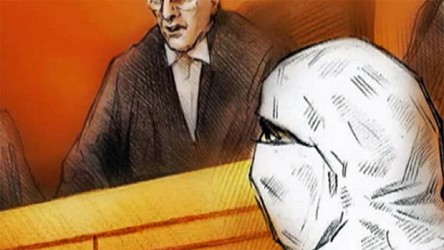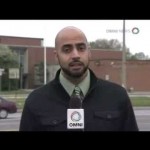Believers need to build bridges of understanding.
by Mehdi Rizvi
Recently, news surfaced about an objectionable anti-Jewish text taught in the East End Madrassah, a Toronto Islamic Sunday school. Such stories about educational institutions seem to be popping up more often these days. South of the border, as part of a course about Islam, an instructor at the US military Joint Forces Staff College told his class that "They [Muslims] hate everything you stand for and will never coexist with you, unless you submit." And the New York Police Department screened "Third Jihad," an Islamophobic movie, as a training exercise for 1500 officers and staff.
These revelations were disturbing, disappointing and discouraging for all peace-loving people.
OMNI news reports the complaints against the East End Marassah.

Toronto's Jewish communities expressed shock at curriculum posted on the school's website that called the ancient Jews "treacherous" and "crafty" and accused them of "conspiring to kill Prophet Mohammed". The Toronto school board later suspended the operating permit issued to the Islamic Shia Study Centre. The school "will not be able to use TDSB property until the police investigation is complete and they are able to demonstrate that they comply with board policies and procedures", said TDSB spokesperson Rayan Bird.
 |
|
An ancient Jewish saying says, "The only cure for baseless hatred is baseless love."
|
|
In a media release, the Islamic Shia Study Centre management immediately offered unreserved apologies to Jewish community for any unintentional offence caused by the lesson.
"Our curriculum is not intended to promote hatred towards any individual or group of people," said the statement. "Rather, the children are taught to respect and value other faiths, beliefs and to uphold Canada's basic values of decency and tolerance. Our team of scholars has already undertaken to review all texts and material being used in the curriculum to ensure that our teachings are conveying the right message."
The Canadian Association of Jews and Muslims expressed concern and regret over the incident, and reiterated that we should be vigilant that an unfortunate incidents like this is not turned into a campaign to single out the Muslim community in Canada.
On the other hand, some extremist circles are trying to blow the incident out of proportion, in an attempt to politicize the issue and achieve some political gains at the cost of Canadian national unity, by saying that the teaching materials involved were written in Iran.
Sayyid Muhammad Rizvi, Imam of the Islamic Shia Ithna-Asheri Jamaat of Toronto, pointed to a long track record of working closely with other faith groups in Toronto, especially the nearby synagogue. He stated on the Jamaat's website that "The East End Madrassah has acknowledged a failure within its internal system that has enabled unauthorized content to be included in the textbook without appropriate review. We are committed to improve the system to ensure that such mistakes are not repeated. This is not consistent with the actions of our numerous sub-committees, affiliates, and initiatives that benefit the community, only one of which is the EEM."
Although anti-Semitism has a long sorry record in Canada, controversies about Islam are fairly recent. A new wave of immigrants who landed after 1970 have altered the religious profile, demographic landscape and multicultural make-up of the country.
According to the 2006 census, Roman Catholics constitute 33.4 percent of Toronto's population. The Anglican Church and United Church of Canada account for 6.9 percent apiece. Other religious groups include Islam (5.5 percent), Hinduism (4.1 percent), Judaism (3.5 percent), Buddhism (2.1 percent), and Sikhism (1.9 percent). More than 16 percent of the population claim they have no religion.
The word "Islam" means "peace" in the Arabic language. Judaism, Christianity and all other religions brought the same message of peace, love and equality at different times in different lands, urging followers to build a civilized global society, free from prejudice based on caste, colour or creed. Unfortunately, what religions preach honestly, many followers don't practice sincerely.
The real challenge ahead for multicultural societies is where and how to draw a line between hate and history. As Jonathan Kay noted in a Globe and Mail article, "Like the Bible, Muslim scripture contains a lot of material that by modern standards would be considered sexist, homophobic or even anti-Semitic".
The Bible, Qur'an and other ancient religious texts are taken as the word of God by their followers, even though modern standards are much more accepting of differences. Even the faithful hesitate to edit their scriptures, much less allow outsiders to do so.
On the other hand our libraries and websites have a vast literature written by western scholars that condemn Islam, the Qur'an, its laws, and the socio-cultural norms preached and practiced by Muslims. Are archival materials spreading hatred? Or is that material not used by our students and researchers?
History is full of conflicts and contradictions. Although ancient religious texts can't be edited and we can't stop teaching history in classrooms, we do need to remember that history is written by the victors.
It is up to believers to build bridges of understanding. The path to progress and prosperity lies through peaceful co-existence. But creating understanding is a two way process that ought to be reciprocated with friendly gestures and mutual respect, by all segments of society.
The best solution lies in a 7th century saying of Ali Bin Abu Talib, the first Imam and 4th Caliph of Muslims. He said, "We have two kinds of relationships with other human beings. Either we are brethren in faith, or brethren in humanity."
 Mehdi Rizvi is a former member of the Community Editorial Board, Toronto Star and an affiliate of the Center of Excellence for Research on Immigration and Settlement, which is a consortium of three Toronto universities. He is a chemist who has worked in the manufacturing of pharmaceuticals, cement and UV printing products for the last 35 years.
Mehdi Rizvi is a former member of the Community Editorial Board, Toronto Star and an affiliate of the Center of Excellence for Research on Immigration and Settlement, which is a consortium of three Toronto universities. He is a chemist who has worked in the manufacturing of pharmaceuticals, cement and UV printing products for the last 35 years.



